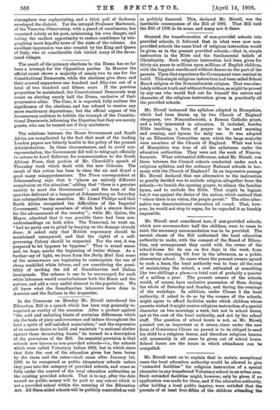Mr. Birrell instanced the syllabus adopted in Hampshire, which had
been drawn up by two Church of England clergymen, two Nonconformists, a Roman Catholic priest, and a lady interested in education. It included, besides Bible teaching, a form of prayer to be used morning and evening, and hymns for daily use. It was adopted by an Education Committee upon which the large majority were members of the Church of England. What was true of Hampshire was true of all the syllabuses under the education authorities. They were not the work of Noncon- formists. What substantial difference, asked Mr. Birrell, was there between the Council schools conducted under such a religious syllabus, and the ordinary National schools in har- mony with the Church of England P In an impressive passage Mr. Birrell declared that one alternative to the instruction so greatly derided was to exclude religion altogether from the schools,—to banish the opening prayer, to silence the familiar hymn, and to exclude the Bible. That might be logical, but it was against the desire of the nation, which realised that "where there is no vision, the people perish." The other alter- native was denominational education all round. That, how- ever, he would not stop to argue, for he regarded it as frankly impossible.






































 Previous page
Previous page